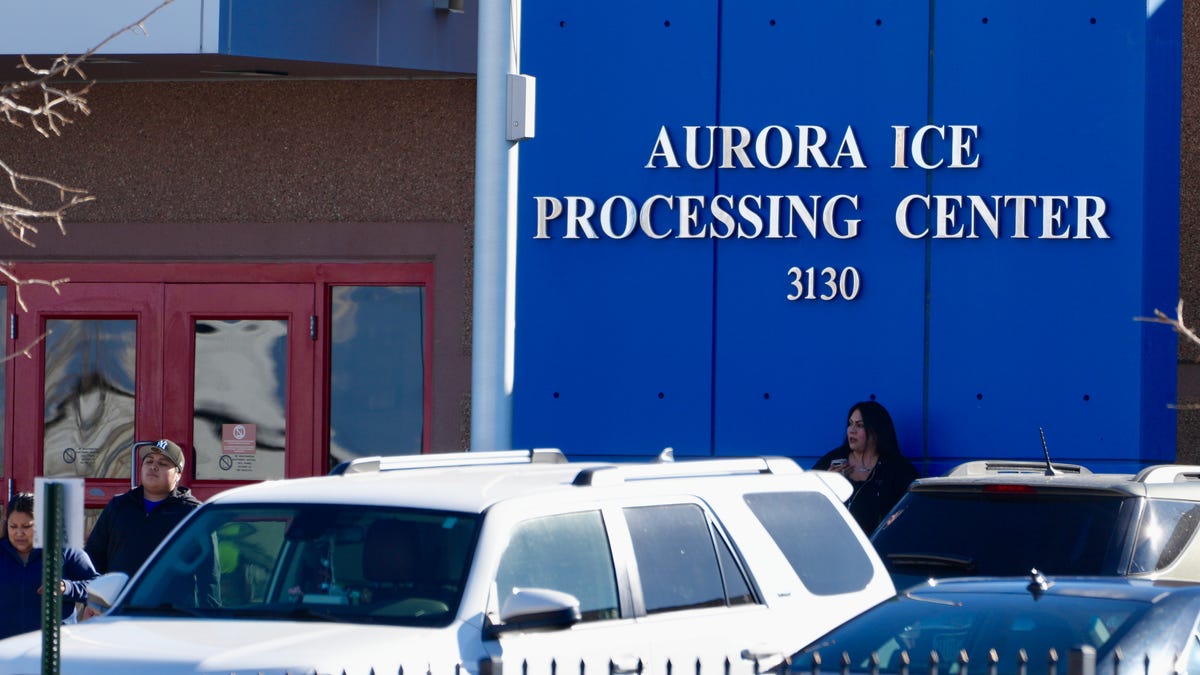Private prison company CEO calls $45 billion detention expansion plans ‘exciting’ as President Trump ramps up deportations
Trump voter’s wife freed after 49 days in ICE custody
Bradley Bartell and Camila Munoz have been reunited after she spent 49 days in ICE detention after their honeymoon.
The Trump administration is preparing to dramatically escalate the number of private contractors it uses to help track, manage, detain and deport people living illegally in the United States, with an eye-popping potential price tag of more than $45 billion over the next several years.
The White House has set a goal of removing 1 million people annually, making good on President Donald Trump’s campaign promise to conduct the largest deportation operation in history.
“If we don’t get these criminals out of our country, we are not going to have a country any longer,” Trump posted on social media April 21.
Among the newest moves are a $72 million no-bid deal to hire a team stacked with former federal officials to fingerprint, DNA test and retina-scan detainees, help manage intake paperwork and track down high-priority targets, freeing up Immigration and Customs Enforcement agents to conduct more arrests.
ICE officials said they don’t have the time to hire federal agents fast enough, and will be able to redeploy more than 650 existing agents once the private contractors come aboard. ICE has 6,000 agents, plus additional support staff.
Expanding detention capacity
Estimates put the number of people living here illegally at anywhere between 10 million and 16.8 million.
Trump has regularly criticized former President Joe Biden for permitting millions of people to enter the United States under parole or an asylum claim after the border was closed during the COVID-19 pandemic.
But Trump faces several challenges to his mass deportation plans, including insufficient detention capacity. He first tried to detain people at the U.S. Guantanamo Bay military base in Cuba, but appears to have backed off that plan over litigation and the significantly higher costs of building a large-scale detention facility offshore. He has also paid El Salvador $6 million to house other detainees.
While ICE has long used private contractors to supplement its work, Trump’s new approach reflects a massive expansion in both staff and facilities. ICE’s current budget is $9.6 billion, with about 41,000 detention beds. ICE reported holding nearly 48,000 people in detention in mid-April.
ICE plans to add up to 60,000 new detention beds in facilities across the country this year, according to contracting details viewed by USA TODAY. Congress is considering a funding bill to pay for the contracting, after approving a temporary $430 million increase in March. Trump has halted most federal hiring, but exempted public safety agencies, including ICE.
“ICE urgently requires additional resources to immediately implement the direction provided” in the executive orders, the agency wrote in announcing one of the contracts. “Increased detention capacity is needed immediately to avoid the release by ICE of a significant numbers of aliens into United States, a situation that poses significant public safety risks.”
ICE says it’s willing to spend up to $45 billion to add those extra beds. Private prison contractors including CoreCivic have seen their stock prices soar as a result.
“This is essential for them to carry out the mass deportations they promised or threatened, depending on your perspective,” said Prof. Michael Kagan, who runs the Immigration Clinic at the University of Nevada-Las Vegas law school, which provides free legal help to people facing deportation. “They’re talking about an almost-unfathomable increase in funding.”
Lakin Riley Act’s impact
In a February earnings call, CoreCivic President and CEO Damon Hininger said the new Laken Riley Act passed by Congress and signed by Trump could alone require 60,000 to 110,000 additional beds.
The law, named for a University of Georgia nursing student killed by a man living illegally in United States, requires ICE to detain immigrants illegally in the U.S. if they’ve been accused or arrested for burglary, theft, larceny, shoplifting, or assaulting a police officer, shifting the responsibility for their custody from local jails to the federal system.
Hininger called it “truly one of the most exciting periods” of his career, and said the company is proposing to provide ICE with 28,000 detention beds. Other beds could come from Geo Group, which also already contracts with ICE.
“We’re still just a few weeks into the new administration, so stay tuned for more on ICE contracting,” Hininger said, according to a transcript of the Feb. 12 call for investors.
Critics worry the expanded use of contractors will make it even harder to monitor conditions within the ICE detention system. The Trump administration has ended multiple monitoring systems designed to provide outside oversight of ICE, along with abolishing internal ombudsman programs that helped ensure the detention facilities weren’t violating detainees’ human rights.
Eunice Cho, senior staff attorney at the ACLU’s National Prison Project said of the expansion: “It certainly represents an astronomical amount of money that ICE is preparing to spend … especially in the wake of such a dramatic push for efficiency, such dramatic cutbacks in government services like Social Security, veteran’s benefits, cancer research.”
